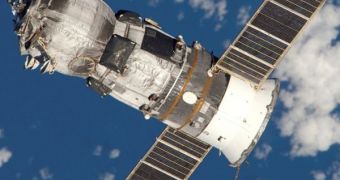Early on Friday, the unmanned Progress 32 Russian spacecraft docked on the International Space Station, in order to deliver the much-needed equipment, clothing and food to the crew stationed in orbit. The docking procedure, which took place 215 miles (346 kilometer) above the Chinese-Mongolian border, went on without a hitch, according to RosCosmos officials. Among other things, the three astronauts composing the current ISS mission received chocolate and coffee, two commodities that were apparently indispensable if they were to successfully carry out their mission.
The two crafts had their orbits perfectly synchronized for the transfer, which occurred at 2:18 am EST (0789 GMT). Flight engineer Yury Lonchakov was in charge of securing the automated cargo ship to the ISS, and he was on edge the whole time, on account of the fact that the last resupply ship, the Progress 31, veered off course upon approach, and needed manual guidance to reach its proper position.
“We usually like to get fresh fruit, onions and garlic. It's like Christmas all over again when you get a vehicle docking to the space station because they always have special treats for us,” NASA's Sandra Magnus, the station flight engineer, told Space.
“Today's a special day. Thank you. Thank you for the spacecraft and thank you for Progress,” Michael Finke, who is a NASA astronaut aboard the ISS, said. Later today, at around 5:15 am EST (1015 GMT), the crew will open the hatch of the newly-delivered ship, which contains 1,910 pounds (866 kilograms) of fuel for the station's orbital engines, as well as 2,866 pounds (1,298 kilograms) of dry cargo. Alongside fresh food and clothing, the astronauts have also received various scientific hardware, as well as the first Russian-built Orlan spacesuit, which will most likely be tested soon.
Also on the Progress 32 are 110 pound (50 kilograms) of oxygen and air, which are indispensable to the ISS being able to sustain life. Now, officials from NASA and RosCosmos maintain that the crew will have everything they need to start preparations for the programed docking of the Discovery space shuttle, later this month, although the official launch data has been postponed a few times.
The American mission to the space station will deliver the last set of solar arrays for the decade-old construction, and will also change a part of the crew, bringing home Magnus, who has been in orbit since November. She will be replaced by Japanese astronaut Koichi Wakata, who is bound to complete the 18th crew aboard the space station. Lee Archambault will lead the new Discovery mission, which is due to carry seven people to orbit for two weeks, until the installation of the new arrays is complete.

 14 DAY TRIAL //
14 DAY TRIAL //